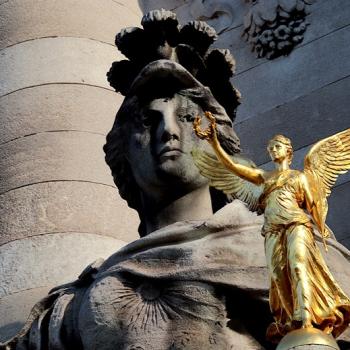One of the religious staples of the Northern Tradition, is the honor and reverence shown for not only our ancestors, but also for our heroes. All too often when reading some of the grand exploits, battles and wars found in the sagas we associate the word hero to that of being a warrior, but while there are indeed many great heroes who are warriors, sometimes heroes are simply those who stay true to their beliefs.
It is a historical fact that the Christian conversion of the pre-Christian peoples wasn’t always a peaceful affair. Some of the early Norse Kings have an especially bloody reputation when it came to killing the pagans within their lands, and these accounts are preserved in part within the Heimskringla, a collection of various historically oriented sagas about the Norse Kings.

In the annals of history, we know far more about the Christian conquering leaders, than we do the names of the devout pagans that would not submit to conversion. Occasionally, we do have preserved the names of some of those ancient pagan martyrs who were determined to continue to honor their Gods and the traditions of their people. One such account occurs in the 11th Century during the reign of King Olaf II of Norway (canonized as Saint Olaf), and it is at this time of year in particular, as we approach the holy tide of Ostara that I always remember and honor in ritual: Olvir. He was a renowned local leader from a powerful family in the Trondheim area of Norway, and as such it fell to him to represent his people to the King, and to conduct religious rites within his local community.
King Olaf II learns that the farmers found within the inner reaches of the Trondheim Fjord observed the heathen holy tide of Winter Nights, by offering drink, food, animal sacrifices, and prayers to the Gods for the purpose of improving the harvests. The report that reached the King’s attention also noted that the people were all of a communal thought that the Gods were angered because a nearby community had allowed themselves to be baptized and converted into Christianity. Displeased, King Olaf II summons forth a group of men from the area including Olvir to give an accounting of themselves.
When the men go before the king, Olvir uses some clever wordplay when he responds to the king that “no one can be responsible for what fools and drunken people say” while being evasive in what he tells the king. Olvir was really in this case an early example of a diplomatic spin-doctor as he downplayed the significance of the gathering to make it seem like it was more a bunch of folks enjoying a feast and some drinks together. While sometimes there is that over-emphasis of the prowess of a warrior in battle, the ancient Norse loved a person of keen-mind and clever-tongue as well, and Olvir definitely had the later skill in spades.
Eventually the king let the men return home, but when a short time later he heard once again that the people had assembled to observe the ancient heathen traditions of Yule. Furious he summoned forth the men again to report to him. This time however, the men who had gone last time before the King did not want to make the journey. While their exact motivations are not known, I think it is reasonable to assume that they were nervous and really did not relish going before a King known for killing pagans again. I also believe that they also recognized that Olvir had been particularly clever in the last exchange with the King. So instead of all the farmers going to the king, the farmers prevailed upon Olvir to go as a representative of all of them.
Again the two exchange words, Olvir attempting to downplay matters and describing it as more or less a grand party and King Olaf II pretty certain that these pagan practices had indeed occurred. The king eventually sends Olvir home, but with a warning: that he shall discover the truth, so Olvir better not participate in pagan practices again.
Yet even this warning would not dissuade the people of Trondheim from the religion of their ancestors. So it came to pass that after the King had celebrated the Christian Easter, his ships were made ready, and he summoned a man loyal to him, Thoraldi, who had recently moved into the area. Before telling the King the truth, Thoraldi made it clear that Olaf must protect him and his family from reprisal, and with that promise in hand Thoraldi became the Judas of the pagan peoples of the Trondheim Fjord.
Thoraldi’s statement to the King is damning, despite the fact many of the people there have been baptized, they’re still heathen in their practices. Observing the major religious holy tides of old (those we call today Winter Nights, Yule and Ostara), and that for this area there are 12 men who it falls to oversee the planning and facilitating of such events and that this year it falls to Olvir to make ready the feast, and that he is doing so even as Thoraldi was speaking to the King.
Furious, the King summons his contingent of more than 300 men who were standing by and they set sail in five ships for the inner reaches of the Trondheim fjord, reaching the area by nightfall. The troops rapidly surround the homes and ensnare the local pagans in the dark of night. Olvir and some of his men were captured and killed immediately. Other homes are ransacked as the King tries to find others he feels are guilty. Some manage to successfully flee, but others still are caught. Their property is confiscated in penalty. The prisoners are then held awaiting a Thing (which was a large gathering of the people where much business was conducted including legal judgments and sentences). These other prisoners represented members of powerful families, and they were essentially being held hostage to force their families to capitulate and convert.
Here was the death rattle of a religion in this area, propelled in part by King Olaf’s Christian agenda, political expediency for power and control, as well as what to my mind is no doubt motivated by greed as King Olaf and his soldiers greatly profited from the possessions of the people from the Trondheim fjord.
This Ostara, I encourage all of you to take a moment this year as part of your celebrations to honor the memory of a man who paid the price for his faith. To honor a man who would not turn away from his Gods. We know his name, we know the story, and by honoring him we honor the unnamed compatriots who also died and suffered along with him. He also becomes a symbolical representative of all those who felt so passionately about their religious beliefs they could not in good faith turn their backs on their gods or their ancestral pathways.
So while the Christians celebrate the resurrection of their martyr this Easter, let us pagans celebrate the rejuvenation and return of not only the Spring, but of the old ways, the ancient Gods, and our ancestral traditions.















